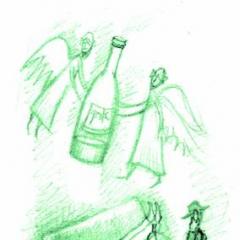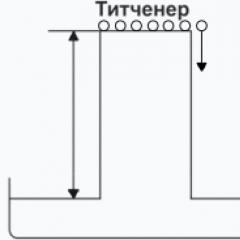Use nouns only in the plural and only in the singular. Plural Execute Using nouns only in the plural and only in the singular
Nouns are divided into three types according to the type of declension:
- Feminine nouns with ending -а, -я(Earth);
- Nouns male with zero ending, neuter nouns with ending -o, -e(house, field);
- Feminine nouns ending in zero (mouse).
In the Russian language, a special group is made up of indeclinable nouns: burden, crown, flame, udder, banner, tribe, stirrup, time, name, path.
A significant group of nouns does not change in gender and number; they are called indeclinable; depot, foyer, aloe, coffee, coat, attache and others.
Adjectives change according to gender, number and case in the singular. In the plural, the case endings of adjectives of all three genders are the same: new tables, books, feathers.
Exist certain rules Declension and numerals. For example, the numeral one is declined as a singular adjective, and the numerals two, three, four have special case forms that are similar to the endings of plural adjectives.
Numerals from five to ten and numerals -twenty and -ten are declined according to the third declension of nouns.
The numerals forty and ninety have two case forms: forty and ninety.
The numerals two hundred, three hundred, four hundred and all numerals starting with -hundred have both parts declined.
On this page you can view the declension of the word “article” by case in both singular and plural. Article is a 6 letter word. Word Declension Table "article" by case is given below. Through search you can find other words you need.
Plural
Singular
It is important to know about word declension
Difficulties in the formation of numeral forms and their use in speech are mainly associated with their change in cases and combination with nouns.
The majority of numerals are declined according to the third declension.
The numeral thousand changes like a first declension noun.
The numerals forty and one hundred have only one form in the indirect cases - forty, hundred...
When declension of compound ordinal numbers changes only their the last part Collective numbers (two, three, etc.) can only be used with masculine nouns, nouns denoting baby animals, or those that only have a plural form.
Combinations of compound numerals ending in two, three, four with nouns that do not have a singular form are unacceptable. Only combinations like twenty-one days, twenty-five days are possible.
The numeral pronoun both has two gender forms: both are masculine and neuter, both are feminine. The same applies to the numeral one and a half.
Adjectives are a part of speech that denotes the attribute of an object and answers the questions which?, which?, which?, which? The adjective has the same case form, number and gender as the noun on which it depends.
In the singular, adjectives change according to gender and case. The gender of plural adjectives is not determined.
The gender of plural adjectives cannot be determined.
Changing nouns by case is characterized by changing their endings, which are called case forms. In total, there are six cases in the Russian language, each of which has its own auxiliary question.
The nominative case form is called direct (or initial), all others - indirect.
Cases express the different roles of a noun in a sentence. There are six cases in the Russian language. You can determine the case of a noun in a sentence by the question.
In addition to the main questions, the case of a noun can also be found out by auxiliary questions answered by the circumstances.
Video lesson in the Russian language "Changing nouns by case"
In order not to miss new useful materials,
But there are also special cases when a noun has only a singular form or only a plural form ( scissors– scissors, always plural; news– news, always singular). We will get acquainted with these nouns in this article.
- We use plural nouns that come in pairs:
Trousers– pants (two legs, we always speak in the plural), and also jeans- jeans, tights- tights, shorts- shorts, pants- underpants.
Pajamas– pajamas (top and bottom).
Glasses– glasses (2 lenses), as well as binoculars- binoculars.
- These nouns are always plural, so they require the plural:
My jeans don’t suit me at all. – My jeans don’t suit me at all. (not my jeans doesn’t)
- If you need to say about these things in the singular, then you need to use a pair of+ these words:
Those are fabulous trousers or that is a fabulous pair of trousers. (but not a fabulous trousers)
I want some new glasses or I want a new pair of glasses.
- These nouns are always plural, so they require the plural:
- There are nouns that end in -ics, and most often it is not plural. For example: economics, electronics, maths, politics, physics.
Politics was his favorite subject in his school that is why he became a politician. (but not Politics were)
- Word news– news is also not plural, despite how we translate it, it is always singular:
What is the last news you read in that newspaper? (But not What are the latest news)
- Some words that end with -s, can be both singular and plural, no matter how paradoxical it may sound:
- Word news– news is also not plural, despite how we translate it, it is always singular:
- It also happens that some singular nouns are used together with the plural form. For example: audience- audience, committee- Committee, company- company, family- family, firm– company, government- state, staff- team, team- team. These are the so-called collective nouns or collective nouns. Have you noticed that all these words name one thing, but, as a rule, they consist of a group of people (family, group, team - all these phenomena cannot consist of one person). And we often think of these phenomena as a group of people ( they– they), which is why we use the verb in the plural form:
The government (they) don’t want to decrease taxes. – The state does not want to reduce taxes.
- We sometimes use the plural after names of companies and sports teams:
Russia are playing Brazil next Monday. (in a football match) – Russia plays against Brazil next Monday. (meaning a football match)
- But it is also possible with such words to use the singular form of the verb, it all depends on what meaning you put into it. If all members of a group, family, state act in unison, in the same way, do one thing all together, then, as a rule, we talk about them in the singular:
The government wants to stop the war. – The state wants to stop the war.
- We use the plural verb with the word police- police:
The police have been investigating this crime for more than 6 months! – The police have been investigating this crime for more than 6 months! (but not has been)
- But we can also talk about the singular if we use words like a police officer / a policeman / a policewoman.
- We sometimes use the plural after names of companies and sports teams:
- Also, we usually do not use the word person– plural person ( persons). Most often said people- People.
She is a great person. - She's a great person.
They are great people. - They are great people. (but not persons)
Many people don’t know where to work. (but not Many people doesn’t know)
- We think about the amount of money ( a sum of money), time period ( a period of time), distance ( a distance) as one thing, so we use the singular form of the verb:
Ten million dollars was stolen from the bank. (not were stolen)
Five years is a very long time, anything can happen at this period of time. (not five years are)
It can be difficult, of course, to immediately remember all these rules, but if you constantly repeat these rules, you will soon not even notice how and where you need to put the singular or plural.
Execute Using nouns only in the plural and only in the singular
AND plural.
Plurals can be of two types:
- distributive, For example, sheet(units) - sheets(plural)
- collective, For example, sheet(units) - leaves(plural).
In this case, the collective meaning can also be expressed as a single number: rags, crow.
Available various ways plural representations:
- Repeat: ( indon. orang - “person”, orang-orang- "People").
- Endings, prefixes, suffixes: (“mole” - “moles”).
- Supplemental number: (“person” - “people”).
- Change of vowel (so-called “broken plural”): (with ar. - “kitab” - “book”, kutub - “books”).
Some authors [ which? ] counting words (numeratives, classifiers) are also considered plural expressions, for example, in the expressions “forty heads of cattle”, “three crusts of bread” the words “heads”, “crusts” are numeratives. [ ] However, this point of view is not generally accepted.
Encyclopedic YouTube
1 / 3
✪ Plural nouns. PLURAL
✪ Russian language 62. Singular and plural nouns - Shishkina school
✪ English grammar. Plurals in English.
Subtitles
Russian language
IN Russian language The plural form of verbs, nouns, adjectives, and pronouns is usually formed by changing the endings.
In Russian, the plural form can also be used to mean the singular. An example is the pronoun “you”, used to express respect for the interlocutor ( polite plural), or plural pronouns used in relation to crowned heads ( plural of greatness): Their Majesties, « By God's grace, We, Alexander the First, Emperor and Autocrat of All Russia...».
IN Russian language The plural without numerals and other words explaining quantity can have the following meanings:
- « more than one": "teenagers came into our entrance" = "more than one teenager entered our entrance."
- « every": "electrons have a negative charge" = "every electron has a negative charge."
- « typical": "birds can fly" = "a typical bird can fly."
- « each of the above": "Ivan and Peter came to us. The guests turned out to be pleasant people.”
- « majority": "The Germans voted in a referendum to abolish the post of president."
- « large group": "cockroaches can make life in the house unbearable."
- generic concept: “birds are a class of vertebrates” (although no bird is a class).
- some games: “catch-up”, “hide and seek”, etc.
- some items: “pitchfork”, “pants”, “scissors”, “watch”, etc.
- monarch's speech: “We command most highly.”
- polite address: “Ivan Ilyich, will you come see us?”
Availability different meanings in the plural it is often used to mislead, for example: “doctors consider our medicine the best remedy for insomnia.”
Other languages
Esperanto
IN Esperanto The plural of nouns and adjectives in the nominative case is formed by adding the plural ending -j to the end of a noun -o or adjective -a(For example, unu kato, multaj katoj; unu seĝo, multaj seĝoj). In the case of the accusative case, the suffix -j added before the suffix -n(For example, multajn katojn).
English
IN English language The plural of nouns is formed in most cases by adding the ending “-s” (for example, one cat, many cats; one chair, many chairs) or "-es" (for example, one bush, many bushes; one itch, many itches):
- if a word ends in a vowel “y” preceded by a consonant, the vowel “y” is changed to “i” and “-es” is added (for example, “family - families”);
- if a word ends in a vowel “u” preceded by a vowel sound, then the ending “-s” is added (for example, “toy - toys”);
- to some nouns ending in the vowel “o” the ending “-es” is added (for example, potatoes, heroes, but: pianos, photos);
- some nouns ending in “-f” or “-fe” are written with “-ves” in the plural (for example, knife - knives, wolf - wolves, shelf - shelves, but: handkerchiefs, roofs);
- exceptions, for example: foot - feet, goose - geese, tooth - teeth, child - children, sheep - sheep, deer - deer, ox - oxen, mouse - mice, louse - lice, man - men, woman - women.
- many nouns borrowed from Latin, ancient Greek and other languages retain the original form in the plural (for example, radius - radii, antenna - antennae, pilum - pila, crisis - crises, bureau - bureaux).
Swedish
In Swedish, the plural is formed according to the following rules:
For en-words:
- If a word ends in a vowel "a", it changes to "or" (for example, en kvinna - kvinnor);
- If a word ends in a vowel "e", it changes to "ar" (for example, en pojke - pojkar);
- Words ending in "are" do not have a special plural form (for example, en lärare - lärare);
- Words ending in "ing" change it to "ingar" (en tidning - tidningar):
- Words with stress on the last syllable always change to "er" (for example, en elefant - elefanter):
- Words ending in "el", "en", "er" usually change to "ar", losing the "e" (for example, en fågel - fåglar);
- Monosyllabic words are appended with "ar" or "er" (for example, en färg - färger, en hund - hundar).
For ett words:
- If a word ends in a consonant, it does not have a plural form (ett barn - barn)
- If a word ends in a vowel, it adds an "n" (ett meddelande - meddelanden).



